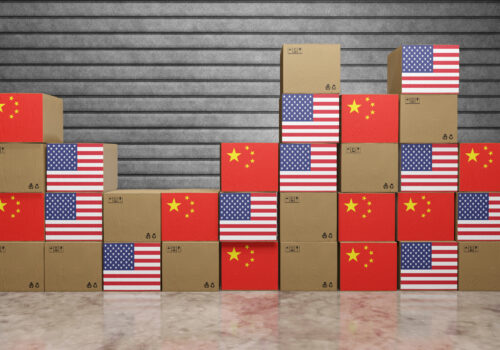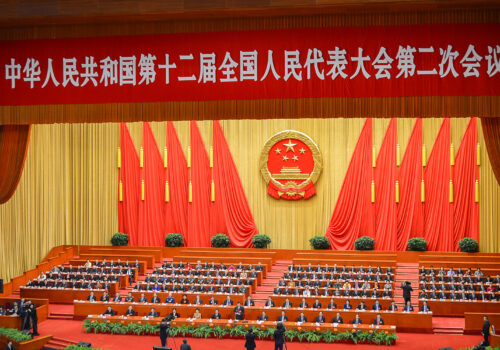How data control is driving a new US-China economic divide
Data has been called the new oil and the new gold for its value to the modern global economy. Just like any commodity, scarcity can lead to problems. The US-China competition discourse about data has focused on sensitive personal data and high-end intellectual property. By contrast, relatively quotidian business information like corporate, trade, and financial data is often taken for granted, even though it is the lifeblood of international commerce. Yet China has been clamping down on the availability of this otherwise routine business information. Beijing’s actions will significantly impact the efficacy of the tools of economic statecraft that the United States and its allies are increasingly using to advance their political goals. The resulting situation is squeezing global businesses, which are forced to make compliance decisions with a paucity of information.
For the past several years, observers have noticed that much of China’s official economic data have gradually become less reliable. Chinese authorities have also restricted key sources of data on inward investment and foreign stock holdings. Last year, China’s biggest corporate and financial data providers and academic databases started limiting access to offshore users, and several US consulting firms were raided by Chinese authorities. Even judicial verdicts are harder to find. In a perhaps related trend, Chinese state-owned firms have increased their presence in the Chinese economy even as the number of private enterprises has grown.
This trend comes against the backdrop of the rising use of economic statecraft by the United States and its allies. No matter how many resources the US government puts behind its new authorities, the reality is that tools like sanctions and supply-chain integrity laws depend heavily on how well they are implemented by private sector actors, such as financial institutions and multinational corporations. The Department of the Treasury’s Outbound Investment Security Program, whose implementing regulations are expected to become effective in the coming months, is a perfect example. This program’s regulations impose a knowledge standard requiring US persons to undertake a “reasonable and diligent inquiry” for the very same kind of information about entities in China that is increasingly unavailable. Similar challenges await in the rapidly growing number of new programs overseen by the Office of Information and Communications Technology at the Department of Commerce. Absent the ability to verify information coming out of China, businesses may decide to abandon deals altogether.
Moreover, the United States may be exacerbating decoupling by its responses to diminishing transparency in the Chinese economy and actions by the Chinese Communist Party that blur the line between private and state-owned firms. The US Securities and Exchange Commission has asked prospective Chinese registrants to define their exposure to the Chinese government, and the Nasdaq has increased its scrutiny of Chinese companies. US lawmakers are clamoring for more laws to force Chinese companies to disclose more information and have expressed interest in preventing “hard-to-evaluate” Chinese stocks from being included in index mutual funds. Moves like these would almost certainly drive the world’s two largest economies further apart.
What is driving this situation from the other side of the Pacific? China understandably doesn’t want routine business information used against it. “The steady contortion of official statistics seems designed to obscure news that might embarrass the government,” according to the Economist. China learned a similar lesson in 2017, when the United States and the United Nations sought to pressure China over its coal imports from North Korea, which subsidized the North Korean regime. Once it became clear that the United Nations Security Council cited these trade records to advocate for a coal ban, China at least temporarily stopped reporting the official data. But it would be solipsistic of the West to assume that corporate governance of private firms in China is all about strategic competition. Many of the same actions that the West may interpret as attempts to obstruct corporate transparency might have far more to do with domestic legitimation and other internal dynamics.
The West’s economic statecraft and its reliance on detailed corporate and trade data is running into an unfortunate reality that trustworthy business data is becoming less available, leaving the global business community in a lose-lose situation. De-risking may lead to a de facto decoupling, which would only drag down global economic productivity. Chinese companies also have been very willing to litigate in US courts in response to economic restrictions, occasionally exposing shoddy evidentiary claims that suffered in part from a lack of quality data. Companies are being forced to choose between the deals they want to execute and the chance that host country governments will penalize them for information they could neither have known nor reasonably obtained.
Jesse Sucher is a contributor to the Atlantic Council’s Economic Statecraft Initiative within the GeoEconomics Center.

At the intersection of economics, finance, and foreign policy, the GeoEconomics Center is a translation hub with the goal of helping shape a better global economic future.
Further reading
Wed, Sep 18, 2024
Stabilizing the US-China trade conflict
Sinographs By
Both China and the US can still find negotiation space for positive-sum outcomes which advance their economic and national security interests.
Tue, Jul 23, 2024
Key takeaways from China’s Third Plenum 2024
Sinographs By Hung Tran
The communiqué of the Third Plenum of the CCP Central Committee lacks major policy initiatives to address the country’s near-term growth challenges.
Thu, Aug 22, 2024
Why the next trade war with China may look very different from the last one
Sinographs By Mrugank Bhusari
Far more countries share concerns over the impact of an expansion of Chinese exports. This time, they will likely target finished consumer goods over intermediary inputs.
Image: Stock market investment trading financial, coin and China flag or Forex for analyze profit finance business trend data background.


